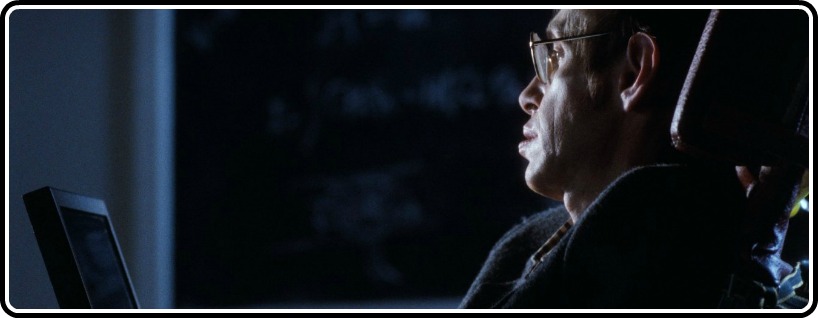
About three years ago, we learned that a number of Errol Morris’ films would be joining the Criterion Collection. Ever since then, we’ve hotly anticipated Criterion editions of some of Morris’ classic documentaries: The Thin Blue Line, The Gates Of Heaven, and others. Last June, Morris took to Twitter, where we revealed that Criterion was working on his 1991 documentary feature on Steven Hawking: A Brief History Of Time.
Errol Morris turns his camera on one of the most fascinating men in the world: the pioneering astrophysicist Stephen Hawking, afflicted by a debilitating motor neuron disease that has left him without a voice or the use of his limbs. An adroitly crafted tale of personal adversity, professional triumph, and cosmological inquiry, Morris’s documentary examines the way the collapse of Hawking’s body has been accompanied by the untrammeled broadening of his imagination. Telling the man’s incredible story through the voices of his colleagues and loved ones, while making dynamically accessible some of the theories in Hawking’s best-selling book of the same name, A Brief History of Time is at once as small as a single life and as big as the ever-expanding universe.
This dual-format release of A Brief History Of Time features two interviews, and a fantastic new transfer. The booklet includes an excerpt from Hawking’s book, a chapter from his memoir, and an essay by David Sterritt. The packaging and cover art is by Rodrigo Corral (he also worked on the artwork for the Trilogy Of Life).
Available today, order the dual format release from Amazon.
Errol Morris’ technique was well defined by A Brief History of Time. He adeptly blends interviews with archival images, animated graphics, and specially photographed sequences to lead the audience through all aspects of his subject. The way he brings to life the various theories from Hawking’s book is particularly impressive, turning somewhat abstract concepts into recognizable sequences by using Hawking’s own metaphors in a more literal fashion. It’s fitting, actually, since Hawking himself apparently began to think in terms of pictures as a way to communicate more effectively when language began to fail him. Cinema, as it turns out, is an ideal medium. The world’s most popular art form is surprisingly agile when it comes to realizing the theoretical scientist’s goal of explaining the fundamentals of the universe to every person existing within it.
“A Brief History of Time arrives as as bit of an oddity on Blu-ray from Criterion who don’t usually venture to documentaries. They’ve chosen a great one. The image quality, in this genre, is always seen as less important to the content. Still this looks pretty solid. It’s dual-layered with a max’ed bitrate n the original 1.85:1 aspect ratio. It is clean and very tight – even the vintage static photography looks super in 1080P. The few close-ups are also impressive. Admittedly, I am less concerned with critiquing the visuals. Mostly I was pleased with how this looks. Great contrast and the variety of images holds up well as does Bailey’s interesting angles in his cinematography. There is no noise. This Blu-ray has no discernable flaws and provided a pleasing presentation supporting the film to the best of the new format’s capabilities.”
A Brief History Of Time is a hybrid in more ways than one, combining not only Hawking’s ideas and life story, but the disparate approaches of Morris’ previous feature-length documentaries, 1978’s Gates Of Heaven and 1988’s The Thin Blue Line. In the former, about a pet cemetery in California, Morris suggested larger, more abstract conclusions about grief and mortality; in the latter, he introduced mesmerizing visual and sound effects to illustrate the flaws in the case against a death-row inmate. Working from a bestselling book that was nonetheless resistant to any kind of screen adaptation, Morris needed to figure out how to make the static look dynamic on two fronts: The theoretical science of black holes and the creation of the universe, and a subject, Hawking, who was confined to a wheelchair and could only speak through his voicebox, by clicking on one word at a time. Morris could not play the passive observer, unless he wanted to make the dullest documentary ever. By taking on this impossible project, he forced himself to get creative.
Criterion’s standard array of care and consideration have been applied. The image is superbly crisp, free of dust and debris. The lighting choices in the film illuminate the interview subjects in interesting ways, with superb contrast, and with excellent detail.
The technical presentation of this truly outstanding documentary film is excellent. The clips from the original interviews boast outstanding depth and clarity. Sharpness and contrast are also very well balanced. Light and colors are used in a variety of unique ways to illustrate some of the key points in Stephen Hawking and these sequences look fantastic. Additionally, there are absolutely no scratches, debris, cuts, stains, or warps. Image stability is terrific. Lastly, there are no compression or encoding issues to address in this review. To sum it all up, this is a very solid organic presentation of A Brief History of Time which more than likely will remain the film’s definitive presentation on the home video market.


